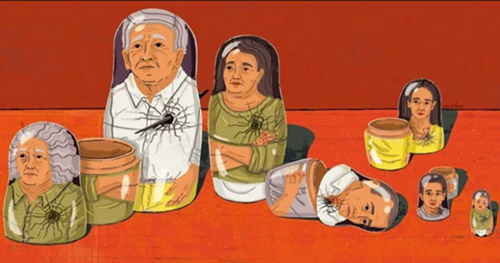by Krishna Taneja, MD and Noshene Ranjbar, MD at University of Arizona Department of Psychiatry, published by ThriveGlobal.com
Exploring the Effects of Intergenerational Trauma
My great grandparents were Indian royalty. But when the India-Pakistan partition was announced in 1947, hell broke loose. Their own people tried to slaughter them simply because they were Hindus in a Muslim-majority Pakistan. Overnight my grandfather went from being a prince to a refugee fleeing for his life. The family spent months struggling amidst the bloodshed, anger, and hatred to make their way to India, where they would rebuild their lives from scratch. In the blink of an eye their entire lives changed and so did ours as their future off-spring.
 The pain, suffering, and loss they experienced was immense. In the struggle to stand back up on their feet, they never had the opportunity to grieve the many losses they experienced; they continued on the best they could.
The pain, suffering, and loss they experienced was immense. In the struggle to stand back up on their feet, they never had the opportunity to grieve the many losses they experienced; they continued on the best they could.
As quoted by Richard Rohr, pain that is not transformed gets transmitted. As a global community we have witnessed immense collective trauma. India and Pakistan as nations still experience the effects of the anger and hatred from the numerous invasions and partition. Wars and corrupt regimes have torn many nations apart. The majority of the world’s indigenous peoples, whose richness of culture was the source of strength and resiliency for thousands of years, have been massacred and immensely disrespected. Centuries of slavery and apartheid, and the catastrophe of the Holocaust have marked generations of survivors with trauma.
Throughout societies that have experienced great trauma, we observe the emergence of various survival patterns. When simple missteps can jeopardize everything, avoidance, fear, and distrust become essential for survival. While these survival patterns may have initially helped people stay alive, when they become modus operandi, they persist as disruptive traits affecting people’s social-emotional functioning, and get passed down through generations. These ingrained survival patterns can linger as risky health behaviors, substance use disorders, anxiety, shame, hoarding, overeating, authoritarian parenting styles, low community trust and cohesiveness, emotional unavailability, and increased violence. These traits and behaviors inevitably affect the children of those who exhibit them.
In other words, people who have experienced trauma pass on the symptoms and behaviors associated with trauma survival to their children in what is called intergenerational trauma. The effects are not only psychological, but familial, social, cultural, neurobiological, and even affect the way our genes are passed down.
The COVID-19 outbreak itself is a collective traumatic experience that has pushed us all into survival mode, where trauma responses are heightened. Pre-existing stressors or survival patterns are exacerbated by lack of resources, the inability to protect and provide for oneself and one’s family, and unending uncertainty. To add to that, the virus has brought the reality of racial inequality to the forefronts. People of color, already facing economic disparities and precarities, are disproportionately likely to lose employment or be forced to take on high-risk low wage jobs and have experienced higher COVID infection and death rates.
It is no coincidence, then, that we are witnessing uprisings during this global pandemic. From religious riots in India to protests in the USA, centuries of suppressed pain and suffering are erupting in public expressions of rage and cries for justice. The murder of George Floyd has served as a reminder of the depth of traumatic racialized loss and oppression faced by our black relatives for centuries.
During previous collective traumatic experiences, people were taught to be ashamed of their language, culture, beliefs, traditions, and skin color, resulting in deep-seated shame and feelings of unworthiness. The only way to survive was by maintaining silence or denying the reality. But now light is being shed on all the darkness, silence, denial, and false hope. It is giving way to live protestations, public acknowledgement, and new visions of the future. This is the first step: to acknowledge and pronounce the causes of intergenerational trauma so we can equip ourselves with the tools to overcome its effects. We need the voices of the oppressed to be heard loud and clear; for the leaders and those in power to bow down, apologize publicly, and for each person to take action towards changing the systemic ways in which the unresolved pain of one generation has contributed to the pain of the next. Each one of us needs an opportunity to grieve, apologize, express, release, and then to rebuild. Then as a society we can join hands and come together in the healing process to address the long legacy of physical, sexual, mental, cultural, and spiritual exploitation across all systems of oppression. Awareness and access to treatments and support systems will help promote the recognition, validation, healing, and reconciliation of traumatic experiences that have affected both past and current generations.
Intergenerational patterns cannot be undone in a day, but with patience and practice we can collectively begin to unearth and resolve trauma for future generations. Addressing past and present-day traumas like racism is the key to helping new generations heal and move on.

